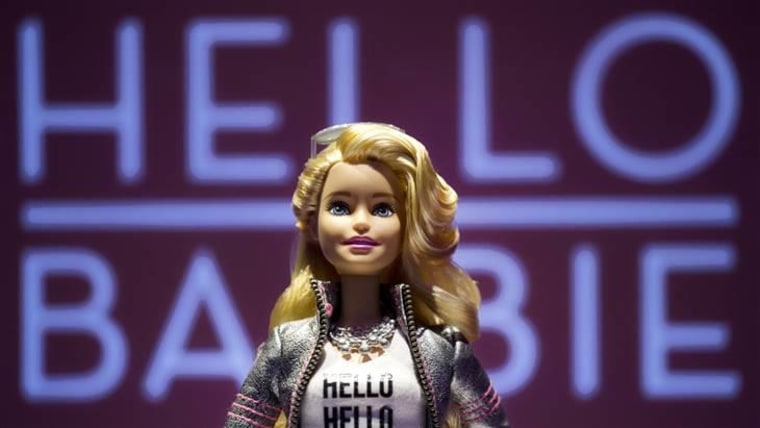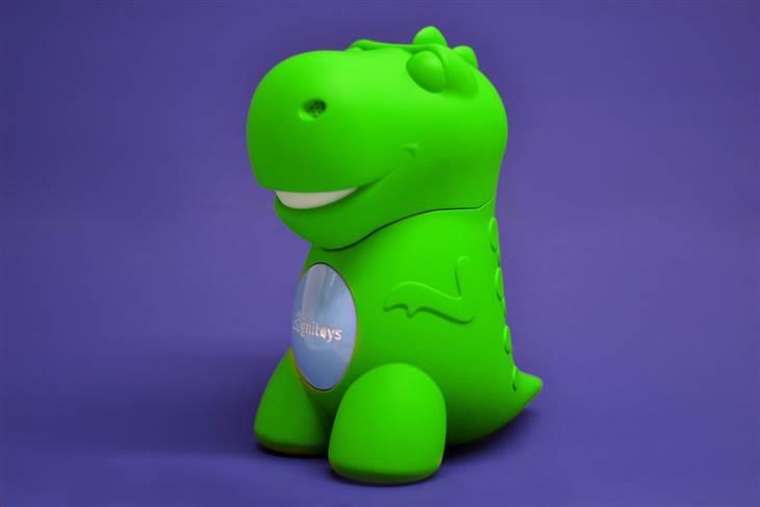Remember in "Toy Story" when the dolls and dinosaurs and action figures come to life?
That could be how your kids play in the near future. Hello Barbie, unveiled earlier this week by Mattel, listens and responds to children who talk to her — even remembering tidbits for future conversations. Another toy, Cayla, is already in stores in the U.K. and can answer questions or talk about her favorite pop star. There are also CogniToys, cute dinosaurs that harness the power of IBM's Watson to play educational games with kids that change as the tikes get older and smarter.

"My kids asked, 'Well, why don't they talk back?'" Jacob told TODAY.
Now he is chief executive officer of ToyTalk, which builds the technology Hello Barbie uses to make conversation. At launch, expected in late fall, she will be able to say thousands of things and talk for hours without repeating herself. As writers add lines and craft her personality, she could could eventually seem as alive to kids as Woody or Buzz Lightyear.
"You see that level of story and character crafted in films and books," Jacob said. "We're going to put that level of storytelling in toys."
Security and privacy concerns?
Hello Barbie, of course, is not alive. She is a doll that connects to a database through a Wi-Fi connection. When a kid presses a button and speaks, his or her speech is analyzed by speech recognition software, and a response is sent back.
Parents will be clearly told what data will be collected, Jacob said, and will have to enter a password every time they want to access that information. That includes audio of their kids talking to their Hello Barbie dolls.
"If there is anything a parent doesn't want on our servers, they can delete that clip or delete them all, and it will disappear," he said.
No data will be stored on the doll itself, he said. Hello Barbie also only says things written and recorded by Mattel. That isn't how Cayla, which comes to the United States in August, works. She connects to your smartphone via Bluetooth, and answers questions by looking through an encyclopedia and database of details from her imagined life.
She isn't supposed to be able to say anything inappropriate — curse words, controversial topics and custom banned terms are blocked — but that doesn't mean she isn't capable of it.
"Being a kid myself, I wanted to see if I could make it swear," Ken Munro, senior partner at security firm Pen Test Partners, told TODAY.
He succeeded. Cayla was "not very difficult at all" to hack, Munro said. At first, he simply intercepted the Bluetooth signal with his laptop, which he said is extremely simple. Then he decided to challenge himself. It took him 30 minutes to modify the app that comes with the doll.
Peter Magalhaes, general manager of Genesis, the Los Angeles-based company that makes Cayla, called it a "tech prank" and said that a patch had been developed to prevent it from happening again.
"I think interactive toys are a phenomenal idea," Munro said. "I'm just really concerned that we make them secure."
The future of playtime
During Mattel's research, the one thing kids said that they most wanted from Barbie was for her to talk, according to Jacob. Think back to Teddy Ruxpin or Furby. Now imagine you're a 9-year-old and your classmates are having animated discussions with a toy that is waaaay cooler than either of them.
In other words, kids are going to want these toys. Genesis has already sold "several hundred thousand" Cayla dolls throughout the U.K. and rest of the world, the company said. She is coming to the United States in August for $59.99, alongside two other smart toys, I-Que the "wise-cracking robot" and a bear named Freddy.
Adults have things hacked all the time. But parents can be more sensitive to people messing with their kids than stealing their credit card information.
"We have seen hackers attack things like baby monitors just to be obnoxious," Kevin Epstein from security firm Proofpoint told TODAY. He was referring to multiple reports of people accessing Internet-connected baby monitors to do things like scream at infants.
Of course, people still use web-enabled baby monitors and find them useful. Smart toys have another kind of appeal for parents.

"Kids grow really quickly, as we all know," Donald Coolidge, co-founder of Elemental Path, the company that builds CogniToys, told TODAY. "Tradtional toys don't grow, they stay the same."
His company raised more than double its Kickstarter goal of $50,000 in two days. Their wireless-connected dinosaurs use IBM's Watson to talk and play educational games with kids. As the children grow, the dinosaur changes with them. All of that data is stored anonymously and is encrypted, the company said.
They need that data, they said, because old-school toys with a few recorded phrases just don't impress kids the way they used to.
"They have grown up with Siri, speech recognition has been around for awhile," Coolidge said. "The technology is just catching up with expectations."
Keith Wagstaff writes about technology for NBC News. He previously covered technology for TIME's Techland and wrote about politics as a staff writer at TheWeek.com. You can follow him on Twitter at @kwagstaff and reach him by email at: Keith.Wagstaff@nbcuni.com
This article was originally published Feb. 21, 2015 at 9:22 a.m. ET.